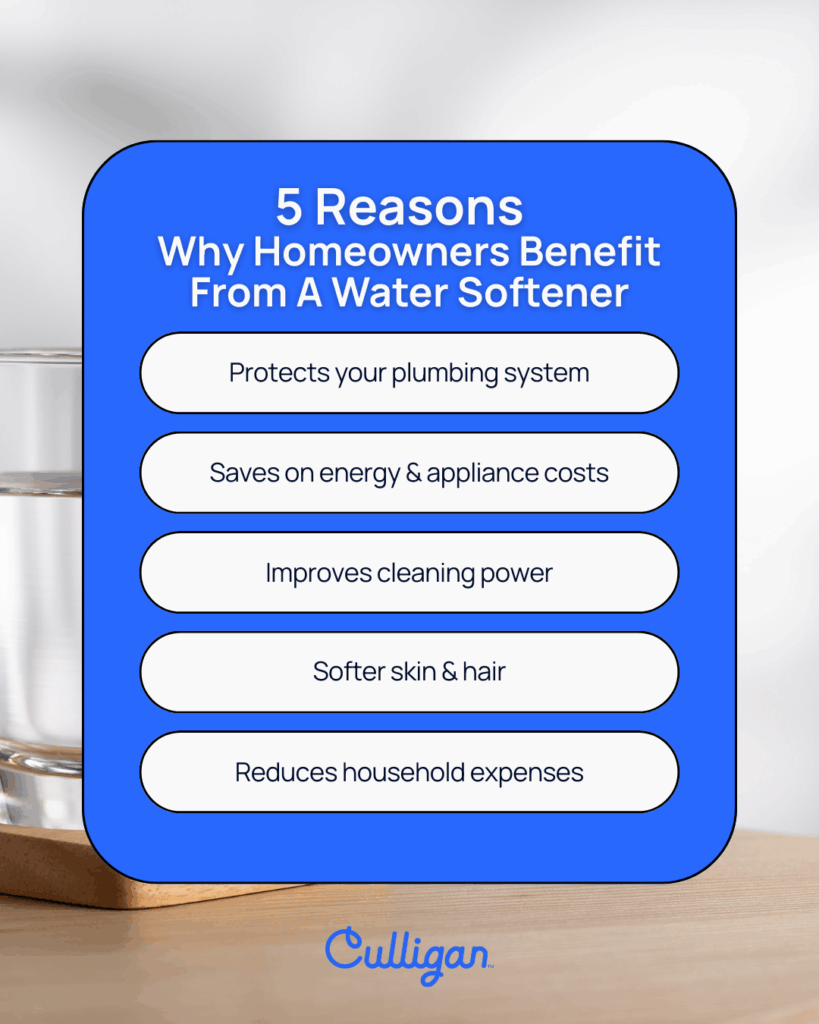Do I Need a Water Softener in Southern California?
Quick Summary: Southern California’s water is some of the hardest in the U.S., with regional averages ranging from 150 ppm in Los Angeles to over 300 ppm in Indio. Local sources like the Colorado River, Coachella Valley aquifer, and Chino Basin groundwater contribute to high levels of calcium and magnesium. This very hard water creates water spots, limescale buildup, clogged plumbing systems, and higher energy costs. A water softening system solves these issues through ion exchange, protecting plumbing, improving energy efficiency, extending the lifespan of water heaters, and enhancing comfort. Culligan offers free water analysis, professional installation, and whole-home solutions tailored to SoCal homes.
Across Southern California, hard water is a common problem. From the coast to the Inland Empire, homeowners face the same frustrating signs: cloudy dishes, white residue on faucets, dry skin, and higher energy bills.
That’s because much of the region’s water supply comes from mineral-rich groundwater or imported sources like the Colorado River. These naturally carry calcium and magnesium, pushing local water into the hard to very hard classification.
So, do you need a water softener in Southern California? For most households, the answer is yes.
Why Water is So Hard in Southern California
Southern California’s climate, geology, and reliance on imported water all contribute to high mineral levels.
Groundwater basins collect calcium and magnesium as water moves through soil and rock, while the Colorado River is known for carrying especially hard water.
Combined, these sources produce hardness levels well above the national average, leaving many SoCal residents dealing with scale buildup, water spots, clogged plumbing systems, and costly appliance damage.
Water Hardness Across Southern California
Hardness varies slightly by region depending on water sources, but most Southern California cities fall in the very hard range. Here’s what homeowners experience in key areas:
Los Angeles
Water comes from the Los Angeles Aqueduct, Colorado River, Northern California imports, and groundwater. Hardness ranges 127–276 ppm (≈ 7–16 gpg), with most homes averaging 150–170 ppm.
Orange County
Water comes from the Orange County Groundwater Basin and imported Colorado River supplies. Hardness ranges 120–300 ppm (≈ 7–18 gpg), averaging around 220 ppm.
San Diego
San Diego relies on the Colorado River, State Water Project imports, and limited local groundwater. Hardness typically falls 180–300 ppm (≈ 11–18 gpg), with averages near 200–220 ppm.
Escondido
Escondido uses Lake Dixon, Lake Wohlford, and Colorado River imports. Hardness averages 225–275 ppm (≈ 13–16 gpg).
Ventura
Water comes from Lake Casitas, Ventura River, local aquifers, and State Water Project supplies. Hardness ranges 180–400 ppm (≈ 11–23 gpg), averaging 220–250 ppm.
Indio
Indio relies on the Coachella Valley Groundwater Basin. Hardness is among the highest in SoCal at 180–400 ppm (≈ 11–23 gpg), averaging 250–300 ppm.
Ontario
Ontario blends Chino Basin groundwater with imports from the Colorado River and State Water Project. Hardness falls 200–300 ppm (≈ 12–18 gpg), averaging 250 ppm.
The Daily Impact of Hard Water in SoCal Homes
No matter which county you live in, hard water creates similar headaches:
- Spotty Dishes and Glassware – Cloudy water spots are common even after dishwashing.
- Scale Buildup – Fixtures and appliances develop stubborn limescale buildup that’s hard to clean.
- Plumbing System Damage – Deposits inside pipes reduce water flow, lower water pressure, and shorten the life of your water heater.
- Dry Skin and Hair – Hard water makes SoCal’s dry climate worse, stripping away natural oils.
- Laundry Issues – Towels and clothing feel stiff, colors fade, and detergents don’t perform well.
Why Southern California Homes Benefit from Water Softeners
A water softening system uses ion exchange to remove hardness minerals, delivering major benefits:
- Protects Plumbing Systems – Prevents scaling and preserves water pressure.
- Improves Energy Efficiency – Helps appliances like dishwashers and water heaters last longer and use less energy.
- Better Cleaning – Soaps and detergents lather better, reducing costs for cleaning products and water filters.
- Healthier Skin and Hair – Softened water reduces dryness and irritation.
- Reduces Household Expenses – Fewer repairs, lower utility bills, and longer appliance lifespans.

Additional Water Treatment Options for SoCal Families
Many households pair softeners with other Water Treatment Systems:
- Water Filtration – Improves taste and reduces chlorine in tap water.
- Reverse Osmosis – Provides purified drinking water for the kitchen.
- Water Conditioners – Alternatives that reduce reliance on sodium chloride while helping prevent scale buildup.
Takeaway: Why Choose Culligan in Southern California
Culligan has decades of experience serving Southern California households, from Los Angeles and Orange County to Ventura, San Diego, and the Inland Empire. With Culligan, you’ll get:
- Systems designed for SoCal’s unique water supply challenges
- Whole-home protection for plumbing and water heaters
- Professional installation and reliable ongoing service
- A free water analysis so you know exactly what’s in your tap water
- Options for Water Conditioners and full-service maintenance
If you’re ready to protect your plumbing system, save money, and enjoy softer water, Culligan can help anywhere in Southern California.
